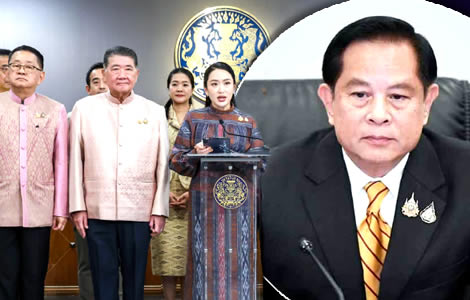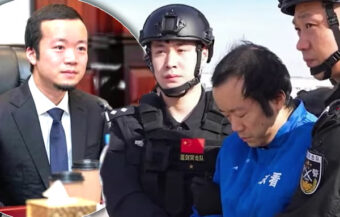Tensions rise as Bhumjaithai ministers arrive late and energy minister skips meeting amid Thai cabinet turmoil. Prime Minister Paetongtarn faces pressure over reshuffle and border talks with Cambodia while conservatives and activists demand a tougher stance.
A tense cabinet meeting on Tuesday at Government House, marked by the absence of party leader and deputy prime minister Pirapan Salirathavibhaga, highlights growing divisions within the Thai cabinet. This comes as the government of Paetongtarn Shinawatra moves forward with talks with Cambodia, including direct discussions with Prime Minister Hun Manet and his influential father, Hun Sen. Meanwhile, conservative forces in Thailand seem to be gaining momentum, fueled by nationalist rhetoric and ideology in response to the situation. The border dispute has created an extremely volatile environment, coinciding with escalating political tensions between the Bhumjaithai Party and the Pheu Thai Party.

With the government still locked in a tense standoff over the Thai-Cambodian border, signs of internal conflict appeared closer to home on Tuesday. The weekly cabinet meeting revealed clear signs of unrest and confusion among ministers.
Firstly, ministers from the Bhumjaithai Party, including Deputy Prime Minister and Interior Minister Anutin Charnvirakul, arrived more than 30 minutes late. This delay was significant because Prime Minister Paetongtarn Shinawatra had already briefed the cabinet about the Thai-Cambodian border situation before their arrival. The meeting took place at the Thai Khu Fah Building within the Government House complex.
Secondly, Deputy Prime Minister and Energy Minister Pirapan Salirathavibhaga was absent from the meeting altogether. Curiously, though, he was present in the building, as later confirmed by a visitor.
Growing pressure for cabinet reshuffle as rival parties dispute key ministries and political power balance
Meanwhile, 21 MPs from the United Thai Nation (Ruam Thai Sang Chart) Party have reportedly written to Prime Minister Paetongtarn demanding changes to the cabinet lineup.
Last week, talks between the Bhumjaithai Party and the United Thai Nation Party were reported. Meanwhile, the Pheu Thai Party is aiming to take over the Ministry of the Interior from Bhumjaithai. However, Prime Minister Paetongtarn has not publicly admitted this shift. Yet, the 38-year-old leader has hinted at a potential cabinet reshuffle soon.
This political tension unfolds amid the broader Thai-Cambodian border dispute. On Sunday, Cambodia certainly took a step back. It withdrew its troops from an area occupied before the May 28 firefight with Thai troops. It also agreed to joint patrols and a return to 2024 lines. Nevertheless, the dispute remains unresolved.
On Tuesday, after the cabinet meeting, the Prime Minister said the government was actively talking with both Cambodian Prime Minister Hun Manet and his father Hun Sen. However, she noted that not all negotiation details could be shared publicly.
Conservative critics intensify attacks on government amid allegations of cosy ties to Cambodia’s leaders
This cautious approach carries risks for the Prime Minister. She and her father Thaksin Shinawatra are already suspected by arch-conservatives of being too close to Cambodia’s leadership.
Meanwhile, decisive military action over the weekend appears to have sharpened Cambodia’s focus. Nonetheless, Cambodia insists the border dispute should be referred to the International Court of Justice (ICJ).
This insistence has stirred political tensions within Thailand. On Tuesday, the cabinet rejected a request from the Bhumjaithai Party-controlled Senate to hold a joint session debate on the crisis.
Outside Government House, activist Sondhi Limthongkul led a protest after the meeting. He urged the Thai government to reject the ICJ and tear up the 2001 Memorandum of Understanding (MOU) with Cambodia.
Mr. Sondhi was a key figure in protests leading up to Thailand’s 2006 coup d’état. He supports however negotiations with Cambodia through the Joint Border Commission (JBC).
Cabinet meeting marked by tension as ministers arrive late and key leaders absent amid political manoeuvring
Clearly, dangerous tensions are rising around Prime Minister Paetongtarn’s government. She would be wise to rely more on the Royal Thai Army than on promises from Cambodia’s leadership.
The cabinet’s mood on Tuesday was gloomy and tense. The meeting was scheduled for 10:00 a.m. but only began near 10:40 a.m. because Bhumjaithai Party ministers entered late.
Prime Minister Paetongtarn arrived at 10:15 a.m. and immediately briefed other ministers on the border situation. By 10:40 a.m., the Bhumjaithai ministers finally joined, but the discussion on the border issue had already ended.
Deputy Prime Minister and Energy Minister Pirapan Salirathavibhaga, leader of the Ruam Thai Sang Chart Party, did not attend the meeting. Interestingly, he stayed inside the Government House complex, working in his office. Later, an advisor to Pirapan visited him, reinforcing speculation of behind-the-scenes manoeuvring.
Despite this, the cabinet approved several items, including an urban plan for Saraburi Province, ratification of an International Labor Organization convention and a major investment in rice and beef production aimed at boosting the economy.
Prime Minister refuses to comment on cabinet demands while affirming peaceful progress in border talks
At 1:30 p.m., after the meeting, Prime Minister Paetongtarn refused to answer questions about the letter from 21 Ruam Thai Sang Chart MPs requesting cabinet adjustments. Instead, she left the press conference quickly.
Regarding the Thai-Cambodian border, the Prime Minister reiterated that negotiations are progressing smoothly. She spoke of close coordination with security forces and military leaders on both sides. Talks have been peaceful, preventing any violent clashes.
The Prime Minister admitted she personally communicated with Cambodian leaders Hun Sen and Hun Manet. She described her approach as honest and sincere, focused on peace and economic stability rather than conflict.
While Cambodia seeks to involve the International Court of Justice, Thailand rejects this move. Instead, the Ministry of Foreign Affairs insists on diplomatic and bilateral negotiations. The Joint Boundary Committee (JBC) meeting is scheduled for June 14.
PM Paetongtarn urges calm and responsible reporting, rejects rumours of border closures amid negotiations
Ms. Paetongtarn emphasized that not all details of these talks can be publicly shared. She also clarified that border crossings would remain open on a schedule to support international trade, countering rumours of permanent closures.
She thanked officials involved in the negotiations and appealed to the media for responsible reporting. “We must avoid creating division,” she said, “to maintain confidence and stability.”
When asked if there would be no war, the Prime Minister firmly answered, “Yes.” She explained that both sides are adjusting forces respectfully to avoid escalation.
On the domestic front, activist Sondhi Limthongkul led a delegation to submit a letter demanding the government maintain Thai sovereignty. The letter called for cancelling MOUs 43 and 44, rejecting ICJ jurisdiction, and relying solely on the Joint Boundary Commission.
The group urged stronger protests against Cambodia’s claims to four temples and the Trimuk Pavilion. They also demanded the cancellation of outdated maps that have fueled border disputes for decades.
Protesters call for harsher measures including cutting utilities and possible martial law if border talks collapse
Furthermore, they called for increased pressure on Cambodia to curb crime and illegal activities near the border. If talks fail, they recommend cutting electricity, mobile signals, and oil supplies to Cambodia. Indeed Thai security agencies are already proceeding with such plans as part of a crackdown on border crime.
Anutin rejects Interior Ministry shift or indeed any Bhumjaithai Party cabinet moves. Cites 2023 deal
Cambodian troops withdraw from near Chong Bok but questions still remain over this week’s border crisis
Lastly, the group further suggested the military should declare martial law if the situation worsens. They fear political leaders may collude with Cambodian officials for personal gain, risking national interests.
In summary, the Thai government faces a complex crisis. Border tensions persist with Cambodia, cabinet fault lines are surfacing at home and activist pressure is mounting.
Prime Minister Paetongtarn’s leadership will be tested in the coming weeks. Whether diplomacy or force prevails remains uncertain, but the stakes for Thailand’s Pheu Thai-led government are high.
Join the Thai News forum, follow Thai Examiner on Facebook here
Receive all our stories as they come out on Telegram here
Follow Thai Examiner here
Further reading:
Reshuffle talks occur against a backdrop of external tensions such as the Cambodian border standoff
Thaksin to address state board on drug suppression despite howls of protest from human rights groups
Health Minister Somsak launches regulatory blitz to outlaw non-medical cannabis use within 40 days


















